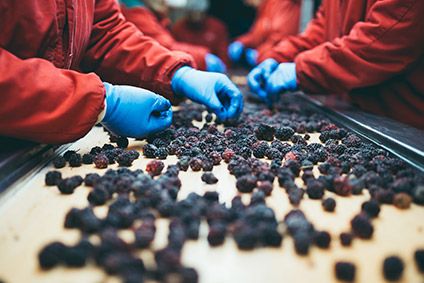
UK food industry bodies have given a muted welcome to the recommendations of an influential committee on the country’s future immigration policy.
The Migration Advisory Committee (MAC’s) review has been produced by an independent committee sponsored by the UK’s Home Office ahead of the Government bringing forward its post-Brexit immigration bill in March.

Discover B2B Marketing That Performs
Combine business intelligence and editorial excellence to reach engaged professionals across 36 leading media platforms.
However, agri-food business remain concerned salary thresholds and skill-based entry requirements will make it hard for them to recruit the foreign workers they need.
The MAC review says, under the current rules, “the skills bar for entry is set too high, targeted at those at the very top of their field”. It called for the expansion of the type of jobs that come under the banner of eligible jobs to include “medium skill occupations”. That would result in lowering the general salary threshold by GBP4,400 (US$5,712) to GBP25,600, it said.
Responding on behalf of UK food industry body the Food and Drink Federation (FDF), its chief operating officer Tim Rycroft called for the government to go further than the recommendations to protect labour-intensive businesses.
He said: “Reducing the GBP30,000 minimum salary threshold for skilled workers to GBP25,600 is a step in the right direction from the MAC and partially reflects FDF’s call to lower the salary threshold along with the skill threshold for this visa. Nevertheless, we would urge the government to consider going further still by adopting the ‘going-rate’ system outlined in the previous Home Secretary’s letter to the MAC as part of a new system that would also allow our members to recruit the talent they need at all skill levels.

US Tariffs are shifting - will you react or anticipate?
Don’t let policy changes catch you off guard. Stay proactive with real-time data and expert analysis.
By GlobalData“The new immigration system must also be accessible for the many food and drink manufacturers who will be recruiting via an immigration system for the first time. EU nationals currently make up a quarter of our 430,000 person workforce and a survey of our members showed that 95% employed EU nationals without the need for visas.
“Many of these will be small or medium sized businesses who are unable to afford expensive legal fees and the new system must be streamlined to reflect this.”
Kate Nicholls, CEO of foodservice industry body UKHospitality, also does not think the recommendations go far enough.
“The future immigration system needs to work for the entire UK economy. That includes the hospitality sector which is the third largest employer in the country and provides jobs, training and opportunities in every region,” she said.
“Although the vast majority of the sector’s workforce is home-grown, businesses, particularly those in cities, need to bolster their teams with overseas workers. Hospitality is committed to upskilling its domestic workforce, but in the meantime, businesses are going to need to have access to non-UK talent post-Brexit.”
Nicholls suggested, though, the low-skilled temporary visa route into employment “can work” for the foodservice and hospitality sector, as the majority of migrants in hospitality do not work in highly-paid roles.
“The MAC’s proposal that government looks again at how this would work in practice is welcome. A continuing route for these incredibly valuable workers is paramount, particularly as hospitality has had the highest proportionate number of vacancies for the past 18 years,” she said.
She added: “The new system must be flexible enough to address sector-specific shortages across the economy and we are happy to work with to make the case for our industry.”





